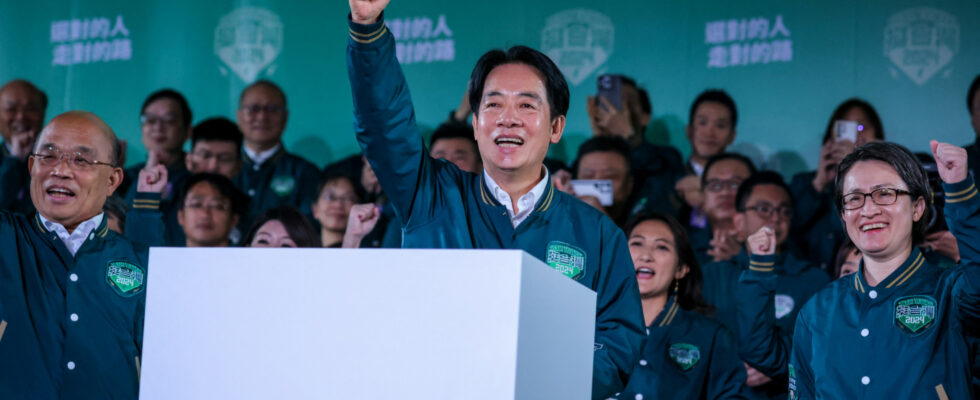He described himself, in the past, as a “pragmatic architect of Taiwan’s independence”, but has since softened his speech: Lai Ching-te, elected president of the island on Saturday, is considered a “serious danger ” by Beijing, which claims sovereignty of the territory. “We tell the international community that between democracy and authoritarianism, we will be on the side of democracy,” he proclaimed on Saturday evening after the announcement of his election, in front of the crowd of his supporters. However, he promised to “continue exchanges and cooperation with China”.
Miner’s son
Vice-president for four years, this son of a miner, aged 64, studied at Harvard in the United States and was first a doctor at Tainan hospital, in the southwest of the island. Of modest origin, unlike the majority of the Taiwanese political class, he was raised by his mother after the death of his father when he was a child. Described as pugnacious and combative, Lai Ching-te, who also calls himself William Lai, decided to enter politics in 1996, when Beijing carried out missile test firings around Taiwan at the time of the first democratic presidential election.
“I decided it was my duty to participate in Taiwanese democracy and help protect this nascent experiment from those who wished it harm,” he testified last year in the Wall Street Journal. First a deputy then mayor of Tainan, he then became Prime Minister in 2017, for the Democratic Progressive Party (DPP). Beijing called him and his running mate Hsiao Bi-khim, Taipei’s former representative in Washington, a “dangerous pro-independence duo.”
“Desire for continuity”
Already, since the election of the outgoing DDP president, Tsai Ing-wen, in 2016, China has cut off all high-level communication with Taiwan, which it considers one of its provinces. And she increased diplomatic and military pressure as the vote approached. During the campaign, Lai Ching-te said the election was a choice between “democracy and autocracy”, and pledged “unwavering” support for maintaining the status quo across the Taiwan Strait. He also denounced “the Chinese principle of one China”, because “peace without sovereignty is just like Hong Kong”, a former British colony where Beijing has reduced democratic freedoms.
Mathieu Duchâtel, director of the Asia program at the Montaigne Institute, notes at home “the very strong display of a desire for continuity after Tsai Ing-wen”, with “a fairly measured position, promising (that he will not there would be) no bad surprises”. “He wants to reassure above all.” “But there are very strong doubts on China’s side about his deep convictions, they see him as pro-independence.” This week, Beijing described Lai Ching-te as a “serious danger” for relations between China and Taiwan. “If he comes to power, he will continue to promote separatist activities linked to Taiwan’s independence,” said a spokesperson for the Chinese office responsible for relations with the island, Chen Binhua.
“Fierce”
“On the question of independence, Tsai Ing-wen had a much more subtle tactic politically, without claiming, even in the long term, independence, but rather by asserting herself as independent today,” notes Marc Julienne, head of China activities at the French Institute of International Relations (Ifri). This was also the position taken by Lai Ching-te during the campaign. “The question is to what extent Lai Ching-te can maintain the cautious and moderate path traced by Tsai Ing-wen,” asks Amanda Hsiao of the International Crisis Group think tank.
For Sarah Liu, researcher at the University of Edinburgh, Lai Ching-te will continue the search for “less economic dependence on China”. “By strengthening its international position, Taiwan will gain more allies to consolidate its democracy,” she believes. Hoping to appeal to young voters, many of whom are disillusioned after eight years of DPP rule, Lai Ching-te has promised to raise wages, cut taxes and create more public housing.
In a campaign spot, Tsai Ing-wen referred to her pugnacity. “You’re much fiercer than me… you stand up and fight with others,” she tells him in this carefully edited ad, which shows the two of them in a car. “I did it for the security of my country… because the protection of Taiwanese democracy is the most important thing,” Mr. Lai replied, before the outgoing president handed him the wheel. Lai Ching-te is married and the father of two children.
